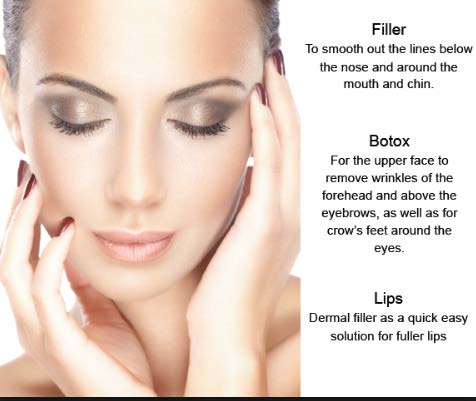Botox-Esthetic and Therapeutic
Botox in a Dentist Office?
Most people are surprised we offer Botox/Filler in our dental office. However, the soft tissues around the mouth are just as important as the color and position of the teeth in determining how your smile looks!
Plus, dentists are the most knowledgeable in the healthcare field on muscles used to chew and the muscles of facial expression, which routinely receive these treatments.

How can Botox Help My Smile?
Most people are surprised we offer Botox/Filler in our dental office. However, the soft tissues around the mouth are just as important as the color and position of the teeth in determining how your smile looks!
Plus, dentists are the most knowledgeable in the healthcare field on muscles used to chew and the muscles of facial expression, which routinely receive these treatments.
How Can Botox Help My Headaches?
While thought of as mostly a cosmetic treatment, Botox actually has benefits that can aid a number of dental issues. Botox has indirect clinical uses for bruxism cases, even more so for patients with moderate chronic TMJ and facial pain, as well as migraines.
The temporo-mandibular joint (TMJ) is located where the jawbone meets the skull on both sides of the head and is used during talking, eating, swallowing, and many other everyday activities. This joint can become displaced or overworked through excessive teeth grinding, which can cause severe tension headaches and sharp pain in the jaw.
According to the American Academy of Facial Esthetics, BOTOX® relieves jaw tension by making muscles unable to engage in the powerful, often unconscious movement of the jaw that produces headaches and pain.
What Things Should You Avoid After Botox?
Although being beautiful is a top priority among many people, there are a number of do’s and don’ts that must be considered after receiving a cosmetic treatment. One of the most popular treatments on the market is Botox, but understanding what needs to be done after the procedure is key to avoid any additional complications. While there are many advantages to getting the Botox procedure done, if you don’t follow certain precautionary measures afterward, you could experience unwanted results. Here are things you should avoid after getting your Botox procedure:
Working Out
This is a big no-no. It is important to let the product settle into your body for the best results for at least 24 hours.
Bothering the injection site
You may feel discomfort after the procedure and want to massage or rub the injection area, but this is to be avoided. Your skin needs to recover from the treatment, so any unnecessary movement in that area can produce unwanted results.
Lying down on your face
The typical time to recover after a treatment is two to four hours, so although you may want to take a short nap, it’s advised that you plan on doing something else during that time period to avoid lying down on your face.
No drinking
You must avoid large quantities of alcohol after your procedure to avoid any negative reactions such as bruising. Do not consume alcohol at least a few days before and one day after your procedure.
No blood thinners
Avoid taking any blood thinners right after your procedure. It is best to consult your doctor to see when you can start taking these types of medications again.
Physical activity
In addition to working out, avoid any strenuous activity that can cause harm to you during this time. Give yourself a 24-hour window before resuming any strenuous activity regimens.
No Touching
In addition to massaging the treated area, you should avoid touching the area for at least six hours after the treatment. After the time period has elapsed, you can gently wash the affected area with soap and water.
Avoid excessive heat exposure
Until the redness and swelling have disappeared, avoid any sunbathing or heat lamp procedures. When getting a Botox treatment, it is important to follow all the protocols and procedure instructions to ensure you have the best results.
Fillers, How Can They Enhance My Smile?
If the search for beauty is timeless, then having the perfect smile is always in style. With an increase of injectable fillers on the market and a bevy of doctors claiming to be lip augmentation experts, we are unfortunately still seeing more and more botched procedures. Why is this an important area of concern for cosmetic dentists? The teeth and the overall structure of the mouth can play a major role in determining the shape of the lips, illustrating exactly why a cosmetic dentist is the true expert in performing procedures to enhance the lips and the surrounding area’s appearance. Lip augmentation is a carefully crafted art, and several factors exclusive to dental training are imperative in performing a successful procedure.
Lip enhancement along with fillers used around the mouth can reduce the signs of aging. In addition to filling in depressed areas or lines around the mouth, hyaluronic acid fillers also stimulate collagen production.
Fillers can be used on almost everyone, but often people who have suffered severe sun damage or deep wrinkles may see dramatic results as in someone with more moderate signs of aging.
Lip filler last on average six months or longer.
Discuss Possible Side Effects with Your Dentist
- Lip augmentation can cause bruising, swelling and discomfort following the procedure. While bruising often can be covered with makeup, a pulsed-dye vascular laser can be used to fade bruising quickly. Swelling usually resolves within a few days, and dentists recommend sleeping with an extra pillow to keep the head elevated. Acetaminophen can be used for pain.
- In rare cases, severe swelling can occur that would require the use of an oral medication, such as prednisone.
- If a patient’s skin is easily irritated and has a history of cold sores, the procedure may cause a flare up and require the use of anti-viral medications.
- Patients who are allergic to any hyaluronic acid products, those with a history of severe or multiple allergies, and those with bleeding disorders or who are on blood thinners or aspirin therapy are not appropriate candidates for lip augmentation.
Home Care After Lip Filler
There will be some swelling associated with lip injections but this is completely normal and no cause for concern. When you return home after your injections, remember to take it easy and follow the instructions you were given by your dentist. Here’s how to give yourself the best home care after getting Juvederm lip injections:
- Ice the area five times a day, 20 minutes on, 20 minutes off for the first few days after your injections. This will help with the swelling and relieve any discomfort.
- Stay away from alcohol for 24 hours after your lip injections. Alcohol can cause your blood vessels to dilate and create bruising around your mouth.
- Don’t wear lipstick right after your procedure. Wait until the swelling has gone down. If you must wear something, we recommend a lip product that is gentle and contains SPF. You can, however, wear makeup on the rest of your face.
- You may be tempted to drink through a straw after undergoing Juvederm lip injections but it’s best not to. Avoid straws because your lips will be swollen and the suction needed to use a straw may prove to be awkward. Once the swelling has subsided, you can use all the straws you want.
- Stay out of saunas and hot showers for the first 24 hours after your lip injections so that your blood vessels don’t dilate. If you do take a shower immediately following your procedure, make sure the water is lukewarm.
- Avoid exercising or other strenuous activities for a full day after your injections. Sweating can raise your blood pressure and prolong the swelling of your lips.
- Some people experience bruising or pain around the injection site. This will subside in a few days. You can take Tylenol deal with any discomfort.
Botox/Filler is offered by Park City Dental Spa. Please call the office to set up an appointment to see if Botox/Filler is right for you.


